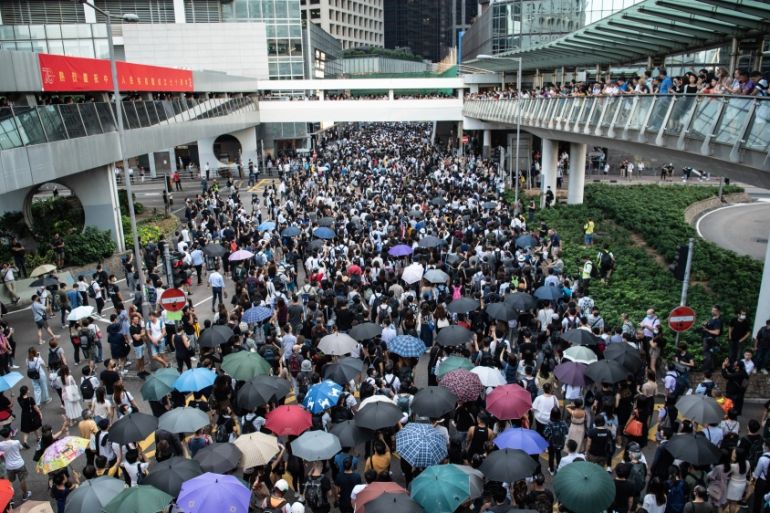Hong Kong protesters rally against ban on wearing masks
Thousands of demonstrators take to the streets as High Court hears challenge to ban on donning masks during protests.

Hong Kong, China – Thousands of protesters have flooded Hong Kong‘s city centre and several neighbourhoods to express their opposition to a new ban on wearing masks during demonstrations.
By invoking the colonial-era Emergency Regulations Ordinance, embattled Hong Kong Chief Executive Carrie Lam bypassed the territory’s independent legislature to put the ban into effect on Friday after midnight.
Keep reading
list of 4 itemsHong Kong’s new security law comes into force amid human rights concerns
Hong Kong passes tough new national security law
What is Article 23, Hong Kong’s new draconian national security law?
This was Lam’s latest move in a desperate bid to deter violent clashes between police and demonstrators who are often masked.
“As a responsible government, we have a duty to use all available means,” Lam said. “The decision to invoke the ordinance a difficult, but also necessary, one for public interest.”
The ban is subject to vetting by the legislature when it reconvenes in less than two weeks.
‘Backed into a corner’
The news of the ban brought crowds of demonstrators to the central business district, plunging it into a virtual lockdown.
Riot police unleashed tear gas to disperse the crowds, and by early on Friday evening, the area was deserted with haphazard roadblocks made of railings and rubbish bins littered about.
“The problem isn’t about masking or not,” said Calvin Chan, a 20-year-old demonstrator, donning a surgical mask.
“Rather, the problem is with how Carrie Lam responds to our demands with such heavy-handed tactics,” he added, alongside a friend of his also wearing a mask. “You can see she’s got so few cards, and she’s backed into a corner.
|
|
“Escalating the violence is the only answer to this authoritarian regime.”
Over the past four months, Hong Kong has been engulfed in anti-government protests triggered by a now-shelved bill that would have allowed the extradition of accused individuals to mainland China for trial.
The unrest has since been fueled by officials’ refusal to address protesters’ demands for an independent inquiry into alleged police brutality in suppressing the protests, blanket amnesty for all those charged with offences stemming from participating in demonstrations, and a retraction of police claims that protesters are guilty of rioting – a charge that carries a heavy prison sentence.
And the drawn-out campaign has since culminated into a pro-democracy movement, with protesters agitating for the right to directly elect their top leader and all the legislators.
Eric TM Cheung, principal lecturer of University of Hong Kong’s faculty of law, said Lam’s move “is setting a very bad precedent” as critics denounced the ban as one step down the slippery slope of eroding the rule of law.
“What we’re facing now isn’t a legal problem but a political problem. With this, the government essentially declared to the world that Hong Kong is no longer beholden to legal procedures,” Cheung said.
A former British colony, Hong Kong was returned to China in 1997 under a “one country, two systems” framework, which guarantees Hong Kong people rights and freedoms under an independent judiciary.
Even as Lam invoked the ordinance, last used in 1967 during a months-long riot, she said: “We’re not proclaiming Hong Kong is entering a state of emergency.”
The ordinance gives Lam sweeping powers to legalise internment, suspend due process, block the internet and censor the media, among other things.
Judicial review
Meanwhile, the High Court heard a challenge on Friday night to the ban in the form of a judicial review.
Anyone who violates the ban can face one year in prison and a $3,200 fine, but questions remain on just how the ban can be effectively enforced.
Ever since the 2003 outbreak of the deadly Severe Acute Respiratory Syndrome (SARS), the surgical mask has become a daily necessity among many of the cleanliness-minded locals who wear it habitually.
Enforcement aside, some feared that the ban signalled that the worst is yet to come.
“The biggest challenge is to one of Hong Kong’s core values, the rule of law,” said Willy Lam, long-time commentator on Chinese politics and senior fellow at Jamestown Foundation in Washington, told Al Jazeera.
“The protesters are becoming more defiant every week, and the police have now been now given new powers to arrest more people,” Lam said. “This will make the confrontation bloodier, and worse.”